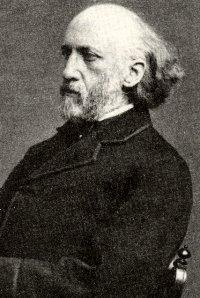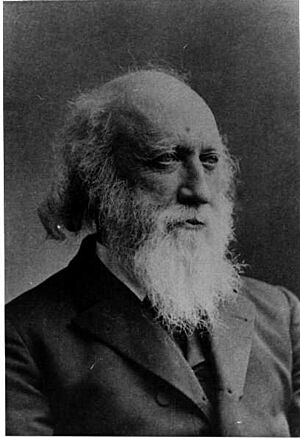Charles Beecher facts for kids
Quick facts for kids
Charles Beecher
|
|
|---|---|

Charles Beecher
|
|
| Born | October 1, 1815 |
| Died | April 21, 1900 |
| Nationality | American |
| Occupation | Minister, composer of religious hymns and author |
Charles Beecher (born October 1, 1815 – died April 21, 1900) was an American minister. He also wrote many books and composed religious hymns.
Contents
Who Was Charles Beecher?
Charles Beecher was part of a very famous family. He was born in Litchfield, Connecticut. His father, Lyman Beecher, was a well-known preacher who fought against slavery.
His Famous Family
Charles had several famous siblings. His sister, Harriet Beecher Stowe, wrote the very important book Uncle Tom's Cabin. This book helped many people understand the wrongs of slavery. His brother, Henry Ward Beecher, was also a famous minister. Another sister, Catharine Beecher, was known for her work in education and women's rights.
Charles's Education and Early Career
Charles Beecher went to Boston Latin School and Lawrence Academy. He then studied at Bowdoin College and Lane Theological Seminary. After his studies, he taught music in Cincinnati, Ohio. He later became a preacher in Indianapolis, Indiana.
A Life of Ministry and Change
In 1840, Charles Beecher married Sarah Leland Coffin. They had six children together. He served as a pastor in Fort Wayne, Indiana, from 1844 to 1851.
In 1851, he moved to Newark, New Jersey. There, he led a church known for its strong views against slavery. This church was later removed from its main group because of its beliefs. Charles Beecher then moved to Georgetown, Massachusetts.
Later, Charles Beecher's beliefs about religion were different from what his church usually taught. Because of these differences, he was no longer able to preach in that church.
After the Civil War, Charles moved to Florida. He worked with his sister Harriet to help newly freed slaves. He even became the state's Superintendent of Public Instruction (a top education official) from 1871 to 1873. He finished his work as a pastor in Pennsylvania. Charles Beecher passed away in Georgetown, Massachusetts.
What Did Charles Beecher Write?
Charles Beecher wrote many books and articles. Here are some of his main publications:
- The Incarnation, or, Pictures of the Virgin and her Son (1849)
- The Duty of Disobedience to Wicked Laws (1851)
- David and his Throne (1855)
- Pen Pictures of the Bible (1855)
- The Life of David King of Israel (1861)
- Autobiography, Correspondence, etc. of Lyman Beecher (1863)
- Redeemer and Redeemed (1864)
- Spiritual Manifestations (1879)
- The Eden Tableau, or, Object Bible-Teaching (1880)
- Patmos; or, the Unveiling (1896)
He also published two books about music. He helped edit a music collection for his brother Henry. Charles also wrote several articles against slavery, like A Sermon on the Nebraska Bill (1854). His travel diary was published later as Harriet Beecher Stowe in Europe.
 | Selma Burke |
 | Pauline Powell Burns |
 | Frederick J. Brown |
 | Robert Blackburn |


